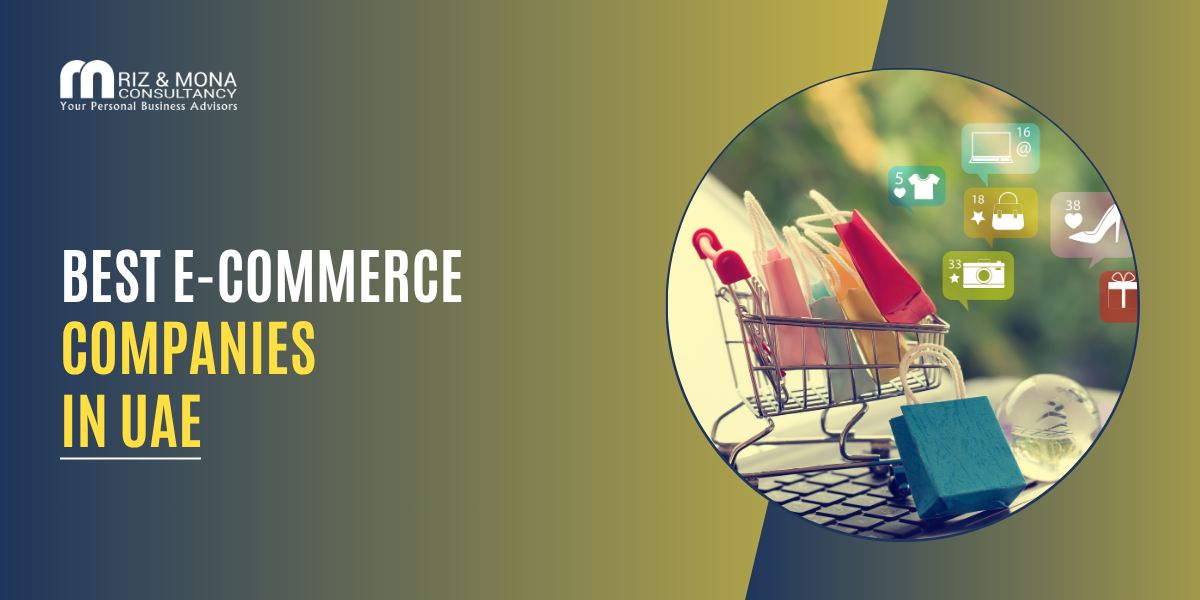E-commerce in the UAE reached $12.28 billion in 2025 and is expected to grow to $21.18 billion by 2030, according to Research and Markets. This growth is driven by business-friendly free zones, reliable cash-on-delivery systems, and a customer base that values speed and quality.Dubai isn’t just a place to sell — it’s where smart sellers build lasting brands.
Whether you’re planning a cross-border brand or a niche store for locals, the best way to begin is by learning from companies that are already doing it right.Some are new, others are growing fast, and many are succeeding with focused strategies. Start here — these are the ones to watch.
21 Best eCommerce Companies in Dubai, UAE
Are you planning to start an online store in the UAE or looking for the best websites to shop from? You’re in the right place.
Online shopping in Dubai is growing fast, and many companies are leading the way with quick delivery, trusted service, and smart business ideas.
Below is a list of the 21 best eCommerce companies in the UAE. These popular and innovative brands are changing how people shop across the country.
- Amazon.ae
- Noon
- Mumzworld
- Namshi
- Ounass
- The Luxury Closet
- Designer-24
- Scarlt
- Sharaf DG
- Letstango
- Seez
- Revent Corp.
- EatEasy.ae
- Les Gastronomes
- Eat Clean ME
- Retail Hub
- Huda Beauty
- Eyewa
- Plantshop.ae
- BeanBurds
- Fibayt.com
1.Fashion E-Commerce in the UAE
Fashion is one of the most competitive categories in UAE e-commerce. Customers expect fast delivery, clear return policies, and access to both global brands and local styles. Below are five e-commerce companies getting it right, each with a distinct model worth studying if you’re planning to launch a fashion-focused online store in the United Arab Emirates.
| Company | What They Sell | Why It Works | Key Insight |
|---|---|---|---|
| The Luxury Closet | Pre-owned luxury fashion, watches, bags | Built regional trust with item authentication | Think beyond one sale — build a buy-sell loop |
| Ounass | High-end fashion & beauty, full-price | Same-day delivery is an expectation, not a perk | Experience trumps discounts in luxury e-commerce |
| Namshi | Mid-range fashion, streetwear, skincare | COD + easy returns drove mass appeal | Own your demographic, not the whole market |
| Designer-24 | Luxury rental fashion for events | Solves one specific use case: event dressing without high cost | Niche focus can win over wide catalogs |
Scarlt |
AI-personalized fashion, trend-driven | Uses AI to recommend by body, lifestyle, & climate | Future is smart curation, not endless browsing |
2.Electronics
In the UAE e-commerce market, electronics isn’t a luxury—it’s infrastructure. People expect fast access to mobile phones, home appliances, laptops, and accessories—often with same-day delivery and real warranties. This category is less forgiving than fashion: if your pricing’s off, your delivery lags, or your warranty terms are vague, you lose the sale. These four companies are holding their ground.
| Company | What They Sell / Do | Why It Works | Key Insight |
|---|---|---|---|
| Sharaf DG | Electronics – smartphones, TVs, kitchen machines | Combines online reach with physical stores for click-and-collect & service | People still want in-person trust when buying high-ticket electronics |
| Letstango | Consumer electronics, gadgets, wearables | Fast shipping, flash deals, warehouse-backed catalog | UAE shoppers value speed over flashiness |
| Seez | Smart backend for e-commerce – automated listings & inventory | Digitally bridges offline suppliers with online platforms | B2B+B2C blend makes it ideal for scaling retail tech |
| Revent Corp. | Refurbished tech for businesses & startups | Targets cost-conscious teams with graded, guaranteed hardware | There’s strong demand in the non-premium tech market |
3.Groceries & Q-Commerce
Selling groceries online in the UAE is a logistics challenge first, a product challenge second. Shoppers care about delivery windows, item accuracy, and payment options like cash on delivery. Margins are thin, returns are rare, and repeat business is everything. Here’s who’s figured out how to make it work.
| Company | What They Do / Sell | Why It Works | Key Insight |
|---|---|---|---|
| EatEasy.ae | Aggregator for food delivery, grocery, dine-in, and more | Built around mobile-first ordering, perfect for daily, quick-use needs | Speed matters more than storytelling in grocery e-commerce |
| Retail Hub | Converts neighborhood grocers into online stores | Helps small retailers digitize without building their own platform | Fix existing retail models instead of creating new ones |
| Les Gastronomes | Premium grocery delivery – meats, cheese, truffles | Focus on curated experience, premium customers, and delivery quality | Built for small, high-margin, curated orders |
| Eat Clean ME | Healthy meals, fitness-focused grocery items, meal plans | Niche appeal to fitness-driven and health-conscious buyers | Win with lifestyle alignment and recurring loyalty |
4.Speciality Brands
Not every e-commerce business in the United Arab Emirates needs to be a marketplace with a wide range of products. In fact, many of the smartest bets in Dubai and Abu Dhabi are niche platforms: solving for one product type, one user need, or one gap in the supply chain. Below are six that deserve attention.
| Company | What They Sell / Do | Why It Works | Key Insight |
|---|---|---|---|
| eyewa | Eyewear – glasses, contacts, sunglasses | Mobile-first, fast, and local shopping experience | Own a category that traditionally needed physical stores |
| Huda Beauty | Globally popular beauty products | Built on trust and community, not just tech | For beauty e-com: credibility beats clever UI |
| Plantshop.ae | Indoor plants, tools, and accessories | Fast delivery + great plant care support | They sell confidence, not just plants |
| BeanBurds | Coffee beans, subscriptions, gear | Targets both casual and pro brewers with marketplace model | Share the supply load via seller networks |
| Fibayt.com | Custom furniture with AR tools | Lets users preview furniture at home before buying | Big-ticket products need big-trust tech like AR |
Popular E-Commerce Marketplaces in the UAE
| Marketplace | What They Offer | Why It Works | Key Insight |
|---|---|---|---|
| Amazon.ae | The UAE’s largest e-commerce platform with fast delivery, wide product range, and Prime-level convenience. | Unmatched infrastructure, deep market penetration, and buyer trust. | Perfect for scale—but discoverability is tough for startups without big budgets. |
| Noon | A homegrown marketplace with competitive pricing, regional focus, and cash-on-delivery (COD) flexibility. | Blends local roots with wide product access and fast fulfillment. | Great visibility—but price competition can drain your margins fast. |
| Mumzworld | Niche-focused on baby, kids, and mom essentials—trusted by families across the region. | High brand loyalty in a high-repeat-purchase category. | Fantastic for parenting brands—less so if you’re outside this vertical. |
What New eCommerce Founders Get Wrong in the UAE (4 Key Mistakes)?
Copying Foreign Playbooks
Many founders try to follow eCommerce models from the US or UK.
But the UAE market is different. Tactics like:
-
Full pre-payment,
-
Long delivery timelines,
-
No local presence
don’t always work well here. Local consumer expectations are different.
Ignoring Cash-on-Delivery (COD)
Cash-on-delivery is still very important in the UAE:
-
31.6% of online orders are paid via COD.
-
71.2% of retailers still offer it as a checkout option (Source: ECBD).
If your business isn’t prepared to:
-
Handle delayed payments,
-
Absorb return costs,
you’ll face serious cash flow issues early on.
Skipping Legal & Operational Setup
Many new founders neglect the basic launch steps:
-
Free zone registration,
-
Customs clearance,
These are mandatory, not optional.
Failing to plan them can delay your launch by weeks.
Expanding Too Fast
The most successful eCommerce businesses in the UAE:
-
Start small,
-
Focus on one product category,
-
Target one region,
-
Solve one specific problem well.
Scale comes only after survival.
Going too broad, too fast is a common reason for failure.
Final Takeaways for E-Commerce Founders in the UAE
This isn’t a hype market. It’s real money, real risk, and real expectations. If you’re building an ecommerce business in the UAE, pay attention to what the top players—both big and niche—are actually doing. The patterns aren’t subtle.
Speed is non-negotiable
Whether you sell mobile phones, fashion, or skincare products, customers expect fast fulfillment. If you can’t deliver same or next day in Dubai or Abu Dhabi, you will lose sales.
Cash on delivery still matters
As of 2024, over 30% of online shopping orders in the UAE are paid via cash on delivery. If you don’t account for failed deliveries or delayed payment cycles, your margins will take a hit.
You don’t need a wide range of products
Most successful e-commerce companies here started focused. One vertical. One audience. One clear need. Scale came only after they proved the model.
Localization wins
From payment options to language, product photos to customer service hours, this market rewards companies that understand where they are and who they’re selling to.
Mobile is everything
Most ecommerce site traffic in the UAE now comes through smartphones. If your design or checkout process breaks on mobile, nothing else matters.
If you’re serious about launching in this region, treat this list as a set of live case studies. Copying blindly will cost you. But learning from what’s already working might give you the edge you need.
FAQS (Frequently Asked Questions)
How were these e-commerce companies selected?
This list focuses on companies either founded in the UAE or actively growing in the region. We’ve excluded global giants like Amazon and Noon to spotlight local and regional brands building real traction across fashion, electronics, groceries, and specialty products.
Which company is best for new sellers looking to partner or list products?
Platforms like Mumzworld, Letstango, and Sharaf DG allow third-party sellers. Some operate as open marketplaces, while others follow a distribution or direct procurement model. Always check listing requirements, payment cycles, and category restrictions before applying.
Are any of these companies based in free zones?
Yes. Many UAE e-commerce businesses operate from free zones like Dubai CommerCity, DAFZA, and JAFZA. These zones offer benefits like 100% foreign ownership, simplified customs, and tailored licenses for digital trade.
Which e-commerce business is best in the UAE?
Amazon.ae and Noon lead in volume, but brands like Mumzworld, Eyewa, and The Luxury Closet dominate specific categories.
Which platform is most used in UAE?
Amazon.ae is the most used, followed by Noon. For fashion, Namshi is strong; for electronics, Sharaf DG.
Which is the cheapest e-commerce license in Dubai?
DED Instant License starts from AED 1,500 annually. Some free zones offer e-commerce packages under AED 6,000.
Is eCommerce profitable in the UAE?
It can be, if costs are managed and the product fits the market. High margins and strong logistics are key.
What is the best product to sell online in the UAE?
Beauty items, electronics, baby products, and home goods perform well, especially when paired with fast delivery.











